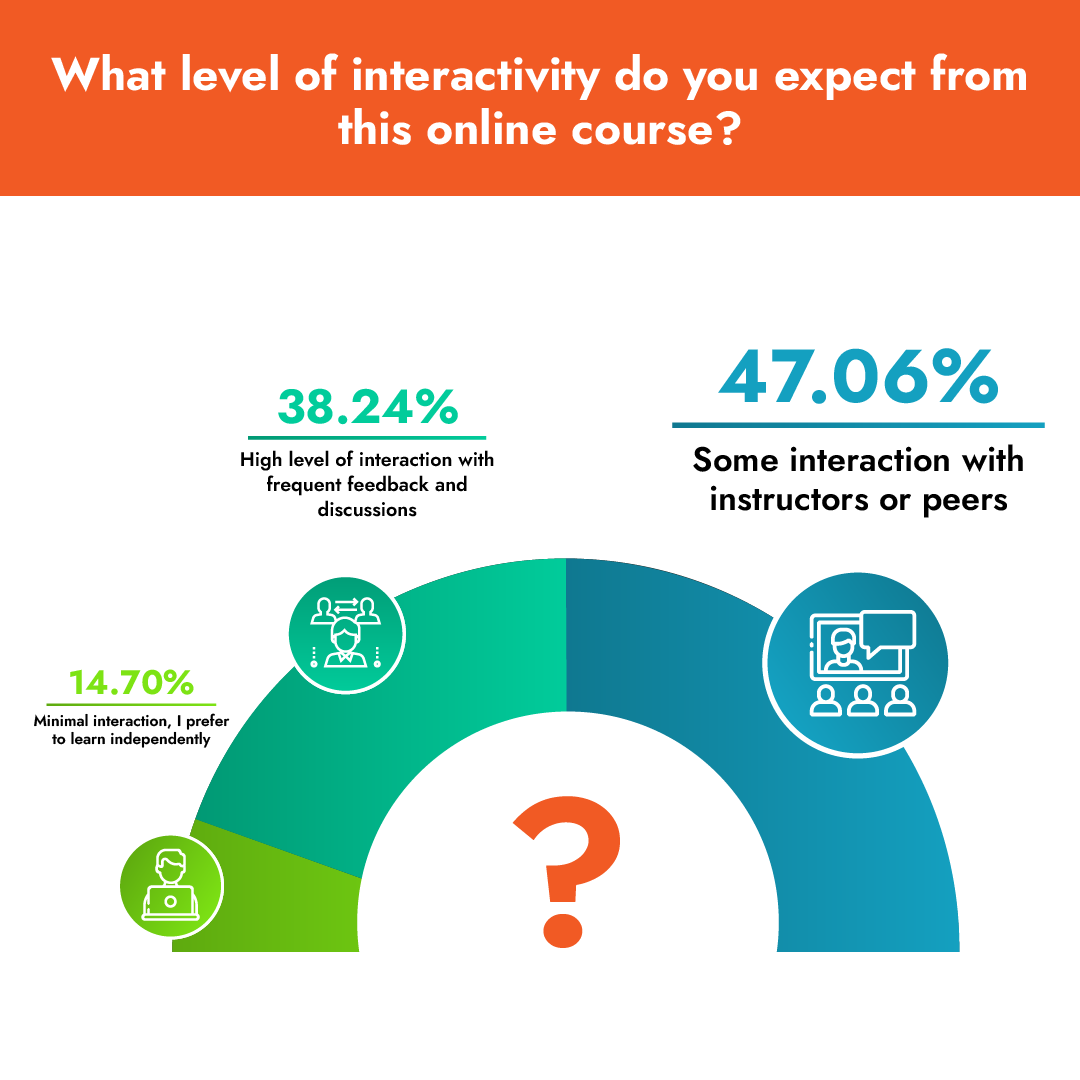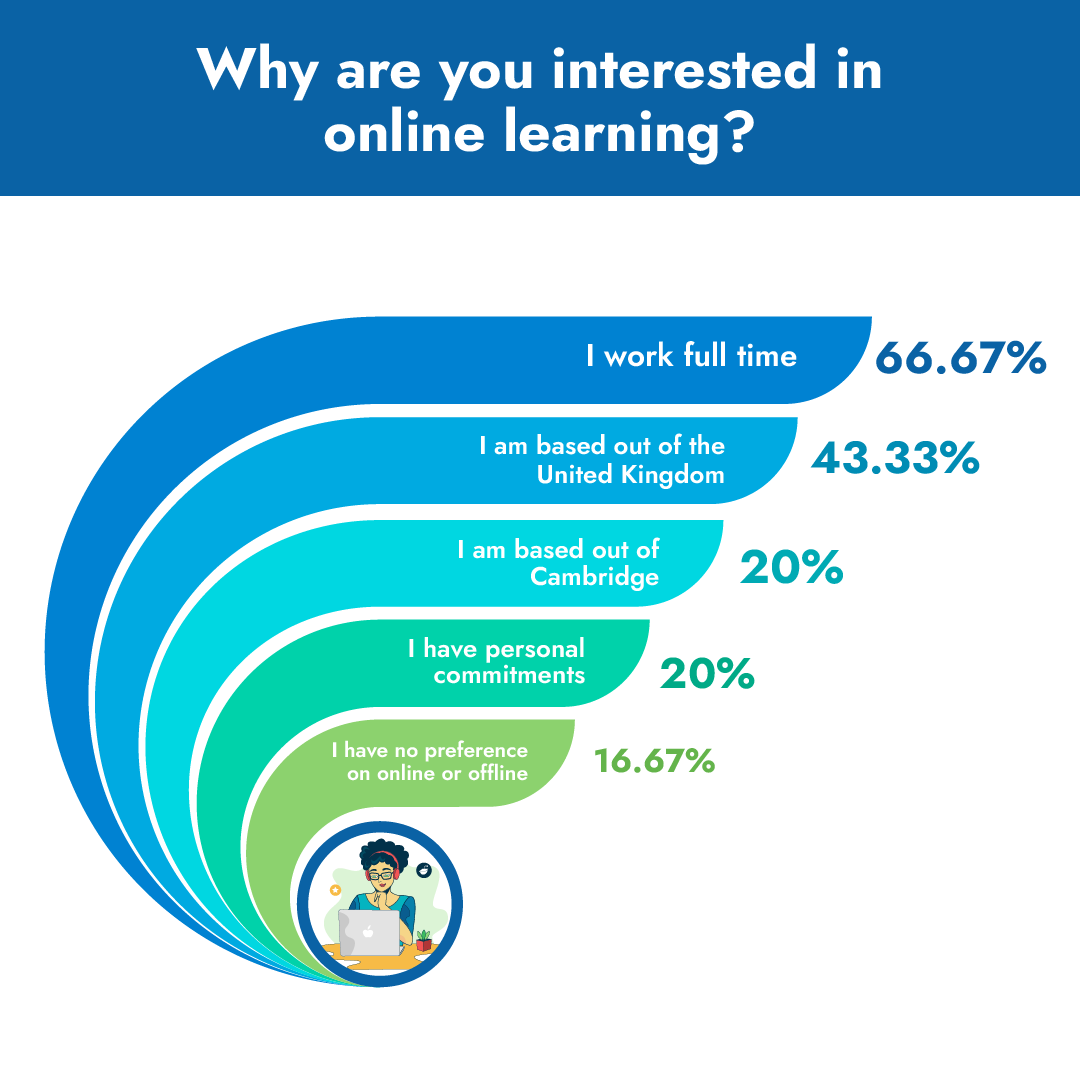CAO
Cambridge Advance Online survey reveals insights on how higher education should adapt to the needs of professional learners
CAO
Cambridge Advance Online survey reveals insights on how higher education should adapt to the needs of professional learners
As the landscape of learning continues to evolve, understanding how individuals learn and engage with online courses provided by higher education institutions becomes paramount. In a recent survey conducted by Cambridge Advance Online, at the University of Cambridge Online, potential learners were asked about their studying habits and preferences.
The results provide valuable insights into the diverse learning approaches and expectations of modern learners and how higher education should adapt to meet their evolving needs.
What learning methods are preferred on online courses in higher education?
When it comes to learning new material in an online course, the majority of respondents expressed a preference for interactive engagement. Watching video lectures emerged as the most popular choice, with a staggering 80% of participants opting for this format. Following closely behind, 60% of respondents indicated a preference for reading text-based content. However, the standout preference was for participating in interactive exercises or quizzes, with a unanimous 100% agreement among participants. This highlights the importance of hands-on learning experiences and active participation in the educational process.

What is the level of interactivity expected from learners?
In terms of interactivity, the survey revealed varying expectations among respondents. While a minority (14.71%) expressed a preference for minimal interaction, the majority leaned towards a more interactive approach. Nearly half of the participants (47.06%) indicated a desire for some interaction with instructors or peers and a significant portion (38.24%) expressed a preference for a high level of interaction, including frequent feedback and discussions. This underscores the importance of fostering a collaborative and engaging learning environment in online courses.

Why do learners choose online learning versus face-to-face?
Understanding the motivations behind online learning is crucial for designing courses that cater to the needs of learners. The Cambridge Advance Online survey revealed that the majority of respondents (66.67%) cited full-time work commitments as their primary reason for opting for online learning. Additionally, factors such as personal commitments (20%) and geographical location, both within the United Kingdom (43.33%) and outside of Cambridge (20%), also influenced their decision. Interestingly, a small percentage (16.67%) indicated no preference between online and offline learning, highlighting the need for flexibility and accessibility in educational offerings.

How higher education should adapt to the new needs of learners.
This survey conducted by Cambridge Advance Online among prospective online learners in higher education reveals fascinating insights that are highly relevant to universities and other learning institutions regarding preferences and expectations.
The findings prove the increasing preference for video (80% of respondents) and interactive learning materials (100%) among learners, signalling a shift towards more engaging and dynamic educational resources.
Interestingly, while learners gravitate towards interactive digital content, there appears to be a nuanced preference for human interaction within the online learning environment. Most respondents expressed a desire for a moderate level of interaction with peers and instructors (47.06%), closely followed by 38.24% who preferred a high level of interaction. Both results highlight the importance of delivering collaborative and supportive learning communities in virtual settings.
Furthermore, the survey shed light on the motivations driving individuals towards online learning. A significant proportion of learners cited their full-time employment status as a primary reason for opting for online courses and also geographical factors as contributing factors to their decision to pursue online education.
These findings underscore the evolving landscape of higher education, where digital technologies are increasingly shaping learning experiences to accommodate diverse learner preferences and lifestyles. As institutions continue to explore innovative approaches to online learning, understanding and addressing the needs and motivations of learners will be paramount in delivering enriching and impactful educational experiences.
By understanding how individuals learn and engage with course material, educators can create more effective and inclusive online learning experiences that cater to a diverse range of backgrounds and learning styles.
From Cambridge Advance Online’s perspective, higher education institutions should prioritise the integration of video and interactive learning materials while fostering a sense of community and interaction within virtual learning environments. By investing in multimedia resources and facilitating opportunities for peer collaboration and live interactions with instructors, institutions can enhance engagement and effectiveness.
Additionally, addressing logistical challenges faced by working professionals and learners outside traditional campus locations through flexible scheduling options and tailored support services will help accommodate diverse needs and expand access to online education, ultimately ensuring accessible, high-quality learning experiences in the digital age.
These insights are aligned with Cambridge Advance Online’s already established approach to learning, materialised into a suite of courses that meets the evolving needs of learners and their course cohort is always up to date with the latest teaching methods.
Find more information about the full range of Cambridge Advance Online suite of courses, designed to meet the needs of professionals at different stages of their careers.



